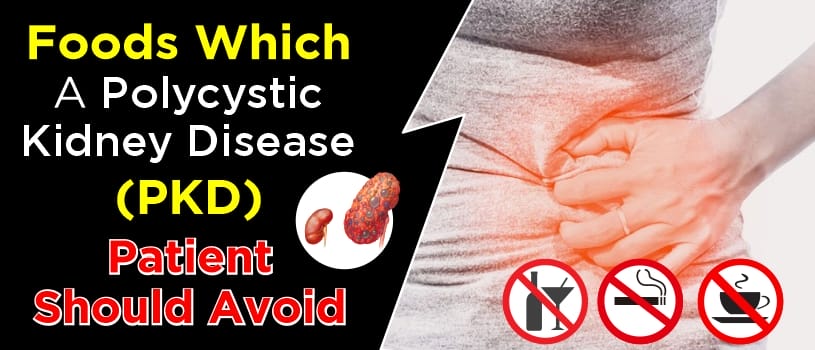If a person has polycystic kidney disease (PKD) or has been living with this condition for quite some time, it is now important to think seriously about it. For a healthy body, it is imperative to free it from any disease. Unfortunately, suppose you have just been diagnosed with polycystic kidney disease (PKD) and have lived with this condition for some time. In that case, it’s very important to maintain a healthy and balanced diet accompanied by drinking plenty of water and fluids to balance overall health and optimize kidney function.
What must a diagnosed PKD patient eat and drink?
The most important question to manage chronic kidney disease is what to eat and in what quantity. According to various research-based evidence, it is found that diet plays an important role in polycystic kidney disease. If a good diet plan is not followed for this disease, it may lead to the progression of the illness and impair the proper functioning of other organs of the body. If a person is diagnosed with PKD, then what foods one should avoid and what one should eat more according to the severity of PKD and level of kidney function is very important to know. Ayurveda has an effective solution for PKD, and it involves a strict renal diet and exercise based on Yoga. Before that, here we will discuss the foods one should avoid if diagnosed with PKD.
For PKD treatment in Ayurveda, the following diets mentioned below must be taken care of. Here we have presented an important list of foods, drinks, and some additives to include or avoid in your diet if you are diagnosed with PKD.
Foods which a PKD patient should avoid in the diet –
At whatever stage of PKD you are, you must avoid or limit the consumption of following foods intake:
1. Salt/Sodium – Salt amplifies the symptom of high BP, People diagnosed with PKD are at high risk for high blood pressure. Over time, high blood pressure can block the arteries around the kidneys from working well, causing kidney damage and kidney failure.
2. Sugary drinks – Hydration plays a critical role in the balance of the body. One should avoid such beverages that cause weight gain or those sweetened. Some soda drinks also contain phosphorous, resulting in lung, eye, heart, and kidney problems. With polycystic kidney disease (PKD), the kidneys will have difficulty removing extra phosphorus from the blood. One should avoid such drinks wherever possible.
3. Coffee and other caffeinated drinks – Caffeine consumption of more than 3 to 6 cups a day is believed to have a moderate diuretic effect means it can cause the frequent urge to urinate. It will cause the kidney to overwork, and therefore its consumption should be limited.
4. Processed foods – Limiting the amount of packaged or processed foods you eat or avoiding such foods is a good practice for kidney disease. Many processed foods contain pre-added sugars and sodium, which must be avoided.
5. Fast foods – One should also limit the amount of fast food because it contains a good amount of sodium and unfortunately it has become a regular food for those staying abroad or away from home. So try to maintain a habit of avoiding those foods to prevent kidney.

6. Alcohol – A moderate amount of alcohol will not affect your kidneys. Still, those with a habit of high quantity of regular consumption can face kidney problems unless your doctor has ordered you to avoid it completely. Excessive drinking of alcohol can dehydrate the body and increase the risk of high blood pressure, which can cause kidney disease.
7. High potassium content foods – Potassium levels can also be elevated in people diagnosed with PKD that progresses to kidney failure. The alternatives of salt contain high amounts of potassium, so they must avoid eating such foods. foods that contains high of potassium include:
- Melons
- Bananas
- Oranges and orange juice
- Tomatoes, tomato sauce, and tomato juice
- Dried beans
- Pumpkin and winter squash
- Greens leafy vegetables (spinach, collards, broccoli, and Brussels sprouts)
- Nuts and Peanut butter
However, foods which are high in potassium are also helpful for health, so don’t completely avoid that from your diet.
Foods which a PKD patient should add to diet –
Some foods that can help you to maintain overall health and improve kidney function. They are:
- Fresh fruits and vegetables – Try to maintain an eating plan which should be high in fruits and vegetables. For example, frozen fruits, vegetables, sprouts that don’t contain added salt or sugar are a good choice, and apart from it, canned vegetables can also be consumed that often contain added sodium, while canned fruit may contain added sugar.
- Water – Being hydrated is one of the important things for health, but there’s a good reason for people who have PKD because they need to hydrate enough. Drinking plenty of water can remove hormones known as arginine vasopressin, which is responsible for cyst growth. But before you increase your regular water intake, check out with a good nephrologist because for those with a very low level of kidney functioning, high water intake can be harmful to some level.
- Protein – rich foods like chicken, fish – Protein helps in building muscle and fighting against infections but consuming too much protein can cause building up as waste in your blood, and your kidneys may be inefficient in removing all of them. one should consult with a doctor to know better how much protein need is good for the body, which varies among different body size and kidney disease stage; for PKD diagnosed patient, good sources of protein include sea-based food like fish, poultry, eggs, legumes, nuts, seeds, and soy products.
